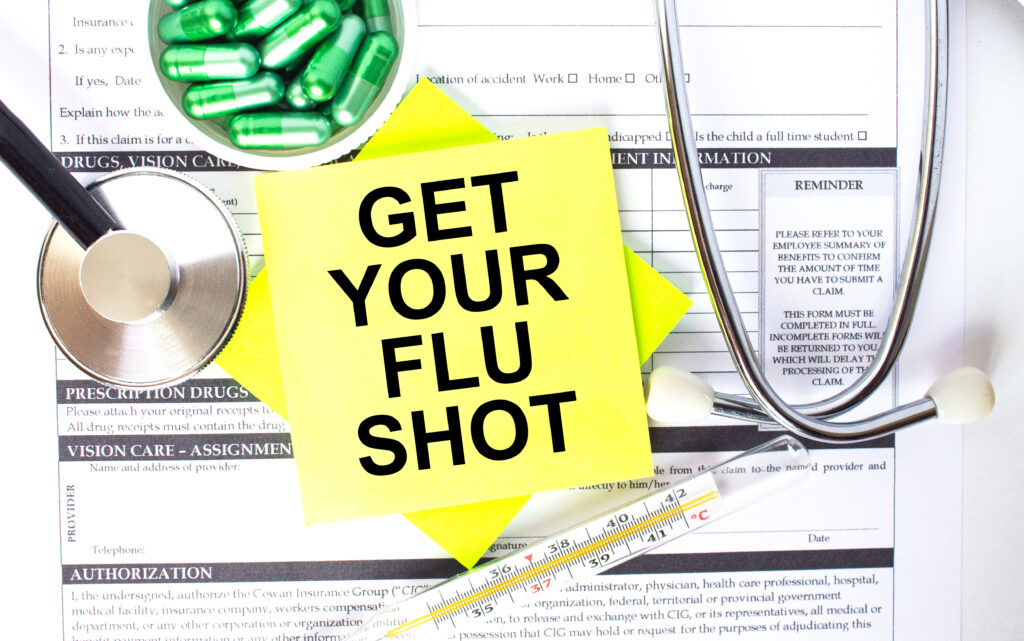Every year around this time, I find myself having the same conversation at least a dozen times a day. Someone sits down in my exam room, and before we even get to why they’re here, they ask: “Should I get a flu shot?”
I’ve been practicing family medicine in Howell, NJ, for close to twenty years now, and honestly, my answer hasn’t changed much over that time. Yeah, you probably should. Let me tell you why I think that.
What I’ve Seen Over the Years
Here’s the thing about the flu—it’s unpredictable. Some people get it and feel lousy for a few days, then they’re back to normal. Others get absolutely leveled. I’m talking can’t-get-out-of-bed, everything-hurts, high-fever-for-a-week kind of sick.
Last winter wasn’t too bad overall, but the winter before that? We got slammed.

Did You Get Your Flu Shot?
I had patients who were perfectly healthy—people in their forties who exercise regularly, eat well, all that—and they were out for two full weeks. One woman told me she couldn’t remember ever being that sick as an adult. Another guy said his body aches were so bad he couldn’t even hold his phone to scroll through it.
And those were the people who stayed home. I also sent several patients to the hospital with complications. Pneumonia, mostly. One elderly patient of mine spent almost a week there. When I saw her at follow-up, she looked at me and said, “I kept telling myself I’d get the flu shot next week. Then next week came and I was busy.” I felt awful for her.
I’m not trying to scare anybody. Most people really do recover fine at home. But you just don’t know which way it’s going to go for you until you’re in the middle of it.
When You Should Actually Get It
People always ask about timing. The standard answer is October or early November, and there’s actually a good reason for that. Your body needs about two weeks after you get vaccinated to build up immunity. Flu season here in New Jersey usually starts ramping up right around Thanksgiving, gets worse in December, and typically hits its peak somewhere in January or February.
So if you get your shot now—early November—you’re covered before things really take off. That’s the sweet spot.
But here’s what I tell people who come in during December or even January asking if it’s too late: No, it’s not too late. Get it anyway. Last year, I had patients get vaccinated in late January who managed to avoid getting sick even though half their office was out with the flu. Is it ideal timing? No. Is it better than skipping it entirely? Absolutely.
Who Really Needs to Pay Attention
Technically, everyone over six months old should get a flu vaccine. That’s the official line. But I’m especially concerned about certain people.
Little kids can go downhill fast with the flu. I’ve seen it happen. A kid is fine in the morning, and by that evening, they’re running a high fever and completely lethargic. It’s scary for parents.
Older folks—anyone over 65—just don’t bounce back the way younger people do. Their immune systems aren’t as robust, and what might be a miserable week for someone younger can turn into a serious medical situation for them.
Pregnant women need to take this seriously. The flu during pregnancy can be dangerous, not just uncomfortable. Plus, when you get vaccinated while pregnant, you pass those antibodies to your baby. That gives them some protection for the first few months before they can get their own shots.
If you’ve got asthma, diabetes, heart problems, or really any chronic condition, the flu makes everything harder to manage. I have one patient whose diabetes control goes completely sideways when he gets any kind of infection. It takes weeks to get things stabilized again.
And look, even if you’re 30 years old and healthy as a horse, you can still spread the flu to people who aren’t. Your grandmother. Your friend’s newborn. The person at the supermarket who’s undergoing chemotherapy. That matters too.
Why People Don’t Do It
I’ve heard every reason imaginable for skipping the flu shot over the years.
“I never get the flu” is probably the most common one. And hey, that’s great. But it doesn’t mean you’re immune forever. Things change. Also, not getting sick yourself doesn’t mean you’re not carrying the virus around and spreading it.
Some people had a bad experience where they got the flu shot and then got the flu anyway. I get why that’s frustrating. The vaccine isn’t perfect—some years it works better than others. But here’s what the research shows: when vaccinated people do get the flu, they’re usually less sick and they recover faster. That’s still worth something.
The “flu shot gave me the flu” thing comes up a lot too. I have to correct this one constantly because it’s just not true. The vaccine can’t give you influenza—that’s not how it works. You might feel a little off for a day while your immune system responds, but that’s completely different from having the flu. Real flu is a week of misery.
Money concerns are real, I understand that. But most insurance covers it completely. No insurance? It’s usually around $30 at a pharmacy. And there are free clinics—the health department here in Howell runs them, and libraries sometimes host them. There are options if you look.
Just Go Get It Done
Here’s the reality: you don’t need an appointment with me or your regular doctor. Every pharmacy around here does walk-in flu shots. CVS, Walgreens, Rite Aid, the pharmacy at ShopRite. You can literally do this while buying milk.
The actual vaccination takes maybe ten minutes total, including the paperwork and the waiting period after. Your arm might be sore tomorrow. You might feel a little tired. That’s it for most people.
Compare that to being sick with the flu for a week or more. High fever, body aches, exhaustion, cough. Unable to work, unable to take care of your kids, unable to do much of anything except lie on the couch, feeling terrible. The math seems pretty straightforward to me.
I got my flu shot back in September. My wife got hers in October. My three kids got theirs a few weeks ago. My parents got theirs. This isn’t about me trying to push something on you that I wouldn’t do myself—I do this every single year.
Flu season is coming whether we’re ready for it or not. You’ve got a straightforward way to protect yourself and reduce your chances of getting seriously sick. Why wouldn’t you take advantage of that?
Stop by a pharmacy this week. Get it done. Your future self—the one who’s not lying in bed with a 103 fever in January—will be glad you did.




